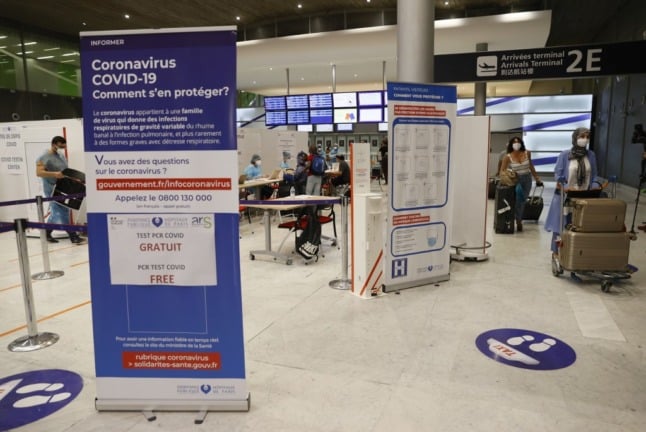If you haven’t had a jab you’ll now have to show a negative PCR or antigen test that is less than 24 hours old to be able to enter France, rather than the 48 hours allowed previously.
Minors over the age of 12 will also have to present a negative test.
However, if you’ve had both doses (France recognises Pfizer,/BioNTech, Moderna, Johnson & Johnson and AstraZeneca, including AstraZeneca Covidshield), you’ll now be exempt from providing a test to enter French territory.
The period of time you need to wait after vaccination has also been reduced: if you’ve had both jabs or a previous infection and one dose, you now only need to wait a week (instead of two) after your jab before you can travel.
If you’ve had just one dose, you need to wait 28 days.
READ ALSO: France to require 24-hour test for UK and some EU countries over delta variant fears
But for those travelling in the other direction, it’s a trickier situation.
On Friday, the UK government maintained the 10-day quarantine requirement for English residents returning to England from France — including those who are fully vaccinated — citing the “persistent presence” of the beta coronavirus variant in France.
British government scientists fear that this variant may be more resistant to vaccines.
READ ALSO: UK says English residents returning from France must still quarantine
The end of the compulsory quarantine for vaccinated English residents returning from countries on London’s “amber” list“ on Monday, July 19th will not apply to France, the Department of Health said in a statement.
The quarantine rule change applied initially only to England, but the devolved governments in Scotland and Wales later confirmed they would follow suit. Northern Ireland has not yet announced its plans.
However, travellers will still be able to cut their quarantine period through the Test to Release scheme, which releases you from self-isolation early if you pay for a private test and test negative on day five.
The Beta variant is reported to be responsible for between 5 and 10 percent of France’s average 5,000 daily Covid-19 cases. According to the French government’s app, the percentage of Beta cases has even been reducing in recent weeks.
Reunion island, in the Indian Ocean, is the only part of France where the Beta variant is dominant and is responsible for most of the country’s cases.
The Delta variant, which was first discovered in India, has rapidly become dominant in most parts of France as it did in the UK. It is reported to be responsible for around 70 percent of cases.




 Please whitelist us to continue reading.
Please whitelist us to continue reading.
Really disappointed that the UK Govt has decided to use figures for Reunion and apply them to mainland France. Makes no sense whatsoever but perhaps they are lacking someone with geography knowledge in the cabinet. Bonkers to say the least. Even more ridiculous as we can travel to EU countries from where family doesn’t have to quarantine and all holiday together there. If we needed evidence they’ve lost the plot, this latest decision is it! UK Govt website also not updated on new French rules. Words fail me!!
Can you believe it? Brits returning from the French island of Reunion (the only place where there is a high concentration of the Beta variant) will not be required to quarantine! See this extract from a report in tonight’s Telegraph. “However, changes to public health regulations published on Sunday have revealed that the added restrictions, dubbed “Amber Plus”, will only cover mainland France, meaning the traffic light ratings of its overseas territories will remain unchanged. The regulations refer only to “metropolitan France”, with officials confirming that Réunion, the Indian Ocean island near Madagascar, will remain on the amber list.
It means that double jabbed Britons who travel to Réunion will not have to quarantine at home on their return, despite figures suggesting that the overall prevalence of covid-19, as well as the beta variant, are very much higher on the island.”
What do people recommend as the best way to get the 24hr antigen test in the UK, before flying back to France?
Any advice welcome. Thanks